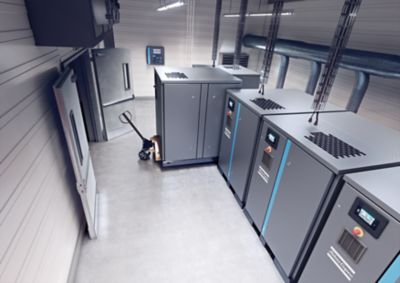In some production environments, maintaining the highest levels of air purity is a critical consideration. From semiconductor and electronics manufacturing to medical and food & beverage, any traces of oil in the air can lead to costly production downtime, product spoilage, and reputational damage.
Why should you download this guide?
Find out more about:
- The basics of oil-free compressed air
- What risks associated with oil-in-air contamination are
- Learn how oil-free compressors work
- Learn the difference between oil-free and ‘technically oil-free air’
- How you can save on energy costs
- How you can save on maintenance costs
- Oil-free compressors in action
A brief overview of the guide
Introducing oil-free air compressors
In some production environments, maintaining the highest levels of air purity is a critical consideration. From semiconductor and electronics manufacturing to medical and food and beverage, any traces of oil in the air can lead...
The risks associated with oil-in-air contamination
In most manufacturing facilities and workshops, tiny traces of oil contamination in the air represent no cause for concern. In such instances, oil-injected screw or vane compressors are the most suitable and cost-effective solution. Indeed, even if there are traces of oil, the air can be...
How do oil-free compressors work?
Oil-free compressors operate without oil in the compression chamber, which eliminates the contamination with oil in the downstream compressed air. Rather than using oil for lubrication, sealing and cooling, these types of compressors will typically utilise other types of technology such as...
The difference between oil-free and ‘technically oil-free’
Selecting the correct type of oil-free compressor for the task at hand can be difficult, primarily because of nuances in terminology that need to be considered to avoid any unintended consequences at the point of use. Compressed air has its own set of International Organisation for Standardisation (ISO) standards. The ISO 8753-1 Standard governs the...
Saving on energy costs...
In addition to saving on through-life costs, using modern oil-free compressor technologies can also deliver significant energy savings. The latest range of rotary screw and rotary tooth Z (VSD+) compressors, for example, offer market-leading energy efficiency performance compared to older designs. At the heart of the Z (VSD+) oil-free rotary screw air compressor range is...
Saving on maintenance costs
Oil-free compressed air systems require fewer pieces of ancillary equipment and less maintenance versus a technically Oil-free system meeting the same ISO air quality. The gulf between the two solutions is further widened when looking at specific applications such as the food industry. Starting with the oil itself, it is important to...
Oil-free compressors in action
Oil-free compressors are a proven technology that have been applied in just about every type of industry around the world. These include...


